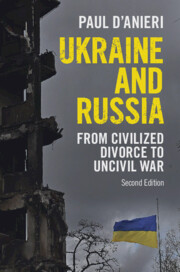Book contents
- Ukraine and Russia
- Ukraine and Russia
- Copyright page
- Contents
- Maps
- Tables
- Preface
- Acknowledgments
- Key People
- 1 The Sources of Conflict over Ukraine
- 2 New World Order? 1989–1993
- 3 Hope and Hardship, 1994–1999
- 4 Autocracy and Revolution, 1999–2004
- 5 Reform and Reversal, 2004–2010
- 6 Viktor Yanukovych and the Path to Confrontation, 2010–2013
- 7 From Revolution to War, 2013–2015
- 8 The Conflict Smolders, 2015–2021
- 9 War
- 10 Conclusion: From Cold War to Hot War
- Bibliography
- Index
3 - Hope and Hardship, 1994–1999
Published online by Cambridge University Press: 13 April 2023
- Ukraine and Russia
- Ukraine and Russia
- Copyright page
- Contents
- Maps
- Tables
- Preface
- Acknowledgments
- Key People
- 1 The Sources of Conflict over Ukraine
- 2 New World Order? 1989–1993
- 3 Hope and Hardship, 1994–1999
- 4 Autocracy and Revolution, 1999–2004
- 5 Reform and Reversal, 2004–2010
- 6 Viktor Yanukovych and the Path to Confrontation, 2010–2013
- 7 From Revolution to War, 2013–2015
- 8 The Conflict Smolders, 2015–2021
- 9 War
- 10 Conclusion: From Cold War to Hot War
- Bibliography
- Index
Summary
The 1997 Russia–Ukraine Friendship Treaty appeared to confirm Ukraine’s borders and to settle the status of the Black Sea Fleet and Sevastopol, but many leading Russian politicians opposed it. Ukraine balanced its fear of Russia by becoming a leading participant in NATO’s Partnership for Peace. Meanwhile, the war in Yugoslavia exposed the tension between the western insistence on “European norms” and Russia’s insistence on its prerogatives as a traditional great power. By 1999, Russia was furious at NATO over expansion and Kosovo, and still sought to reintegrate Ukraine. However, the question of Ukraine remained largely distinct from Russia’s broader relationship with the West.
- Type
- Chapter
- Information
- Ukraine and RussiaFrom Civilized Divorce to Uncivil War, pp. 66 - 101Publisher: Cambridge University PressPrint publication year: 2023

